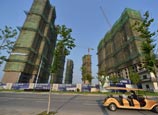
A British researcher says China is the most frequently harmed country by foreign protectionism
Beijing and Brussels are racing to avert an escalation of trade disputes originating from the European Commission's anti-dumping penalty on China's solar panel exports.
Shen Danyang, spokesman for the Ministry of Commerce, said the two sides have "tentatively agreed" to hold an annual meeting of the joint economic and trade commission this Friday in Beijing.
He said the meeting, to be co-chaired by Minister of Commerce Gao Hucheng and EU Trade Commissioner Karel De Gucht, will review the development of bilateral economic and trade relations during the past year, including the dispute over solar panels and other business issues.
"We believe that the two sides will value this opportunity, look at the big picture of bilateral cooperation and reach an agreement that both sides can accept through consultations," Shen told reporters on Tuesday.
Sources in Brussels said the two sides are comparing notes to "fix dates" for more high-level dialogue that could get bilateral relations back on track.
EU Trade Spokesman John Clancy confirmed that confidential technical-level discussions began with a team of Chinese experts in Brussels at the start of the week, a bid to find a negotiated settlement.
It is expected that De Gucht and Gao will discuss this issue on the sidelines of the joint commission. He said both sides have agreed on the commission's agenda.
"It is important to underline that the EU's ambition remains to find an amicable solution as soon as possible, but I should also stress that discussions have only just begun and therefore we are still at a very early stage in the negotiation process," said Clancy.
The Friday meeting was scheduled although Chinese negotiators returned to Brussels for closed-door negotiations this week, trying to find a price compromise for China's solar exports, which the European Commission has characterized as dumping in the European market.
"During De Gucht's visit, I think both sides will consult on solutions to the solar panel dispute as well," said the source, who declined to be identified.
The source said Brussels may also discuss with Beijing on when to kick off a long-discussed bilateral investment agreement.
De Gucht's visit to Beijing may help find common ground for European leaders at the EU summit next week in Brussels regarding trade relations with China.
Separately, the source revealed that State Councilor Yang Jiechi is expected to hold high-level political dialogue with his European counterpart, Catherine Ashton, in Brussels either in the latter half of July or in September.
"Both sides are still fixing dates and these meetings will pave the way for the Sino-EU summit in November and be helpful in solving the solar panel dispute," said the source, who is from the Chinese side.
Beijing has repeatedly urged Brussels to refrain from using protectionist measures and trade defense instruments, which could lead to a no-win situation.
Simon Evenett, director of the London-based Center for Economic Policy Research, indicated in a recent report that protectionism has returned, especially since the final quarter of 2012.
Based on his research, China has become the most frequently harmed country and its commercial interests have been hit by foreign protectionism just under 1,000 times since November 2008. The EU has become a frequent user of trade defense measures, the research found.
If things continue to go in the current direction, Christopher Lewis, senior Fellow of the Schiller Institute in Germany, said the economic relationship between China and the EU will become very difficult.
Saying the solar panel dispute is one of the most significant since the disputes over footwear and textiles, where European factories have generally lost their competitive edge, Duncan Freeman of the Brussels Institute of Contemporary China Studies insists that these disputes are not fundamental to the flows of trade, which are determined by economic conditions and other factors in the EU and China.
"Broadly speaking, the prospects for growth in the EU are weak, and this will continue to have a negative impact on Chinese exports," Freeman said. "And there is little prospect that this will change in the near term."
Freeman said China's economic growth is also slowing and this will limit EU exports to China. 
















 Thousand audition for 'rich blind date' -- being pretty is just not enough
Thousand audition for 'rich blind date' -- being pretty is just not enough


![]()
